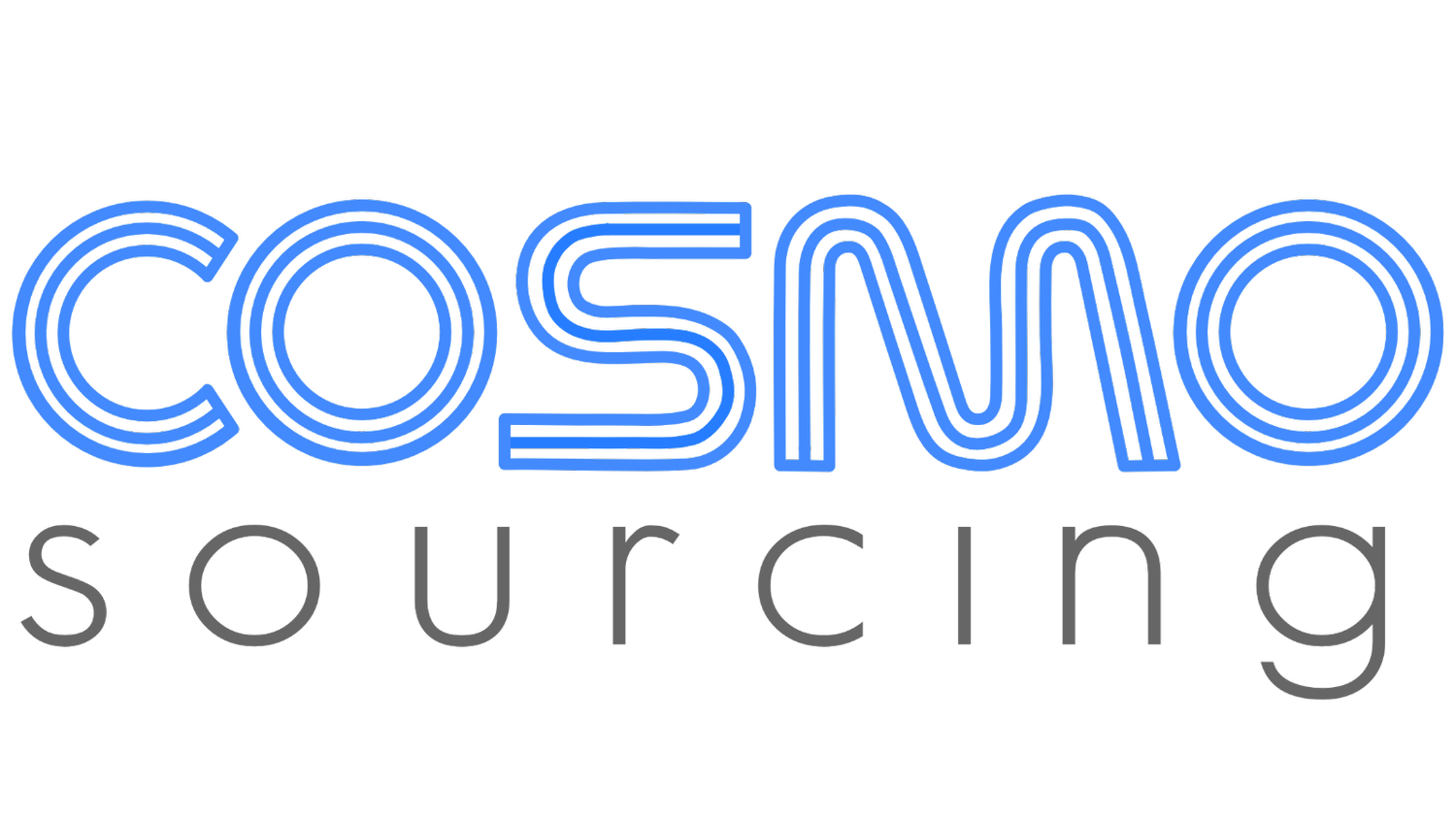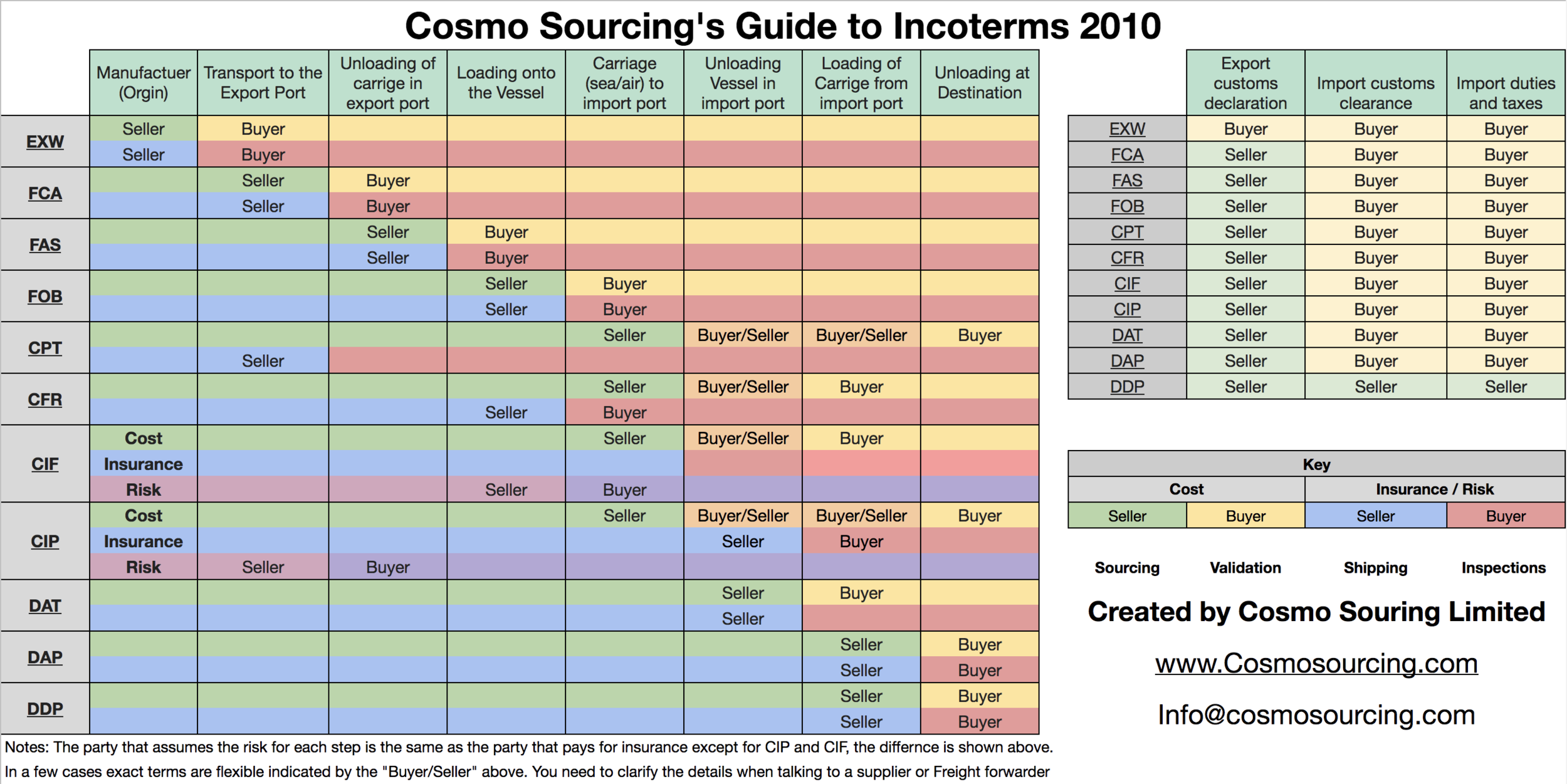Incoterms Defined: What does EXW, FCA, FOB, DAP, DAT, DDP, CPT, CIP, CIF, CFR, or FAS Mean?
Are you unsure about the trade terms of Alibaba or Chinese suppliers? Don’t know what the three letters that came with your quote mean? Cosmo has defined the 2010 Incoterms abbreviations, such as FOB, CFR, and DAP, for international trade.
This article is a shortened version of our guide to Trade Terms, Shipping terms, and Incoterms. You can read the full version here.
Incoterms and Trade Terms Defined
As EXW and FOB are the most common, we’ll start with those two. When we ask for initial quotes from manufacturers in our RFQs, we request they quote prices in EXW and FOB. We want to know the EXW price, which is the product's price. The FOB is to gauge the shipping prices because the port is a good place for our freight forwarder to pick up an item. Most of our projects are FOB; we contract with a freight forwarder to complete the rest of the shipping.
EXW- Ex Works
EXW is the most basic shipping intercom term that a supplier can provide. The seller makes the item available for pick up at the factory and is not responsible for the product once it leaves the factory doors. Instead, the buyer is responsible for transporting it from the factory and covering all export and import clearances and insurance costs.
If you get initial quotes from a factory for the first time, they will almost always quote you for EXW unless you explicitly ask for one in another term. Factories and suppliers quote in EXW simply because it’s the lowest price for them, and it looks good when comparing quotes, and you need the lowest price.
FOB - Free On Board
FOB means that the seller ships the goods to the nearest port, and the seller is responsible for everything after that. The seller will drop this off at the port of shipment, and the buyer will either pick it up themselves or, more commonly, work with a freight forwarder to ship it for them. The seller is the one to clear the goods for export, and the buyer is responsible for the goods from the port onwards. So it’s vital when getting FOB quotes to ensure you get the port’s name where they drop the goods off.
One of the big reasons this is the most popular intercom term is that the export port is an excellent place to have a 3rd party inspection service inspect the goods. Further, the seller is responsible for all activities in the country of export. Simultaneously, the buyer is responsible for all activities once the goods leave the country, making things simple. Besides, most freight forwarders will have an office at or near the port, and it’s an easy spot for them to pick up the goods on your behalf.
FCA - Free Carrier
FCA is just one step up from EXW, in which the seller clears the goods for export and delivers the goods to the port of export. Next, the buyer has to unload the goods in the port and is responsible for them once they reach the port. Next, the buyer arranges the carrier. The most significant difference between EXW and EXW is that the seller must load the goods on the buyer’s carrier. We should note that this is often confusing for FOB, and if you think there is confusion, feel free to ask your supplier to elaborate and give details.
CPT - Carriage paid to
The seller pays for the goods shipped to the buyer’s import port. Once the goods arrive at the port, the risk is transferred to the buyer. The buyer is responsible for unloading the vessel and arranging further transportation. Even though the seller is responsible for the Export port’s cost, the buyer assumes the risk and insurance cost once the goods are unloaded at the Export port. The seller is responsible for export clearance and freight costs.
CIP - Carriage and Insurance paid to
It is effectively the same as CPT, except that the seller is required to obtain insurance for the goods during transit. CIP also covers all modes of transportation, while CIF is specifically for sea freight. We should note that CIP and CIF are the only ways risk and insurance differ. Once the goods are unloaded at the export port, the seller assumes the insurance cost but not the risk until the goods are unloaded at the import port.
DAT - Delivered at Terminal
The seller delivers the goods (unloaded) to the import port, and the buyer is responsible for the cost and risk of the goods from that point on. The seller takes on all risks or costs associated with the goods until they reach the import port. The buyer pays all imports and Customs.
DAP - Delivered at Place
The seller delivers the goods to the buyer’s final destination. The seller assumes all risks with the shipping and either loads or pays a third party to load the goods for shipment. The buyer is only responsible for paying the customs fee and clearing the goods for clearance. The buyer also pays to unload the goods at the final destination.
DDP - Delivered Duty Paid
In these terms, the seller pays for and is responsible for everything. The seller pays all costs and assumes all risks to the final destination. The buyer is only responsible for unloading the goods once they arrive at the final destination chosen by the buyer.
We often get asked, why don’t you get every project DDP? It is easiest for the buyer but will not be the cheapest. The seller is the one who picks the shipping company and will choose the one they like best, not the cheapest or most reliable. You are putting a ton of trust in the shipping company. If you want, I suggest you get a quote for DDP from your supplier, then get a quote for FOB and a freight forwarder and compare the two’s final total prices.
Note: FOB, FAS, CFR, and CIF are specifically for waterway-based shipments (both ocean and inland waterways), while the above is for all forms of shipping, including water. Other forms of transportation can include rail, trucking, or air cargo.
FAS - Free Alongside Ship
The seller is responsible for delivering all goods to the vessel’s side at the named export port. The seller pays for and assumes all risks until the goods are placed in the port and the seller clears the goods for export. The buyer then takes on all costs and risks from that point on, including loading the ship. This has one less step than FOB, in which it bears the cost and risk of loading the ship.
CFR - Cost and Freight
The seller is responsible for bearing the shipping cost until the named import port; however, the risk is given to the buyer once the goods are loaded onto the ship at the export port and the final delivery of goods from the destination port. We should note that this is effectively the same as CPT above, except that CFR is specifically for water-based transport.
CIF - Cost Insurance and Freight
It is similar to the one above, except that the buyer will require the seller to take on the risk or obtain insurance on the goods until the destination port. The seller bears all shipping costs and assumes the risk of the goods until the destination port. The seller is also responsible for clearing customs, but the buyer is responsible for paying the duty. Again, this is effectively the same as CIP, except CIF is specifically for water.
Sourcing Kit // Take Control Of Your Sourcing
Navigating the complexities of international trade can be daunting, especially when understanding and applying Incoterms in your transactions. That's why we've developed the Sourcing Kit, designed to simplify and clarify the sourcing process while ensuring you are fully equipped to effectively manage the nuances of Incoterms.
Why Choose Our Sourcing Kit?
Master Incoterms with Confidence: Incoterms are fundamental to international trade, defining the responsibilities of buyers and sellers in the shipping process. Our Sourcing Kit includes comprehensive guides and resources that demystify Incoterms, helping you understand each term's logistics, insurance, and cost allocation implications. This knowledge empowers you to negotiate better terms with suppliers and manage your supply chain more efficiently.
Streamline Your Sourcing Processes: The Sourcing Kit enhances your sourcing strategy from start to finish. Whether you're a seasoned trader or new to the field, our kit provides the tools and insights to source effectively. From selecting the right suppliers to navigating contract negotiations with confidence, our kit ensures you have all the information you need at your fingertips.
Reduce Risks and Enhance Compliance: With a clear understanding of Incoterms, you can better manage the risks associated with global trade. Our Sourcing Kit helps you ensure compliance with international trade laws and regulations, reducing potential legal and financial exposures.
Take Your International Trading to the Next Level
With our Sourcing Kit, you're not just surviving the complexities of global trade—you're mastering them. Equip yourself with the knowledge and tools to handle Incoterms easily and confidently. Whether you want to optimize your current operations or expand into new markets, our Sourcing Kit is your essential companion.
Contact us today to learn more about how our Sourcing Kit can make a difference in your international trade endeavors. Let's make global sourcing straightforward and successful together!


